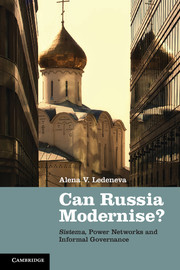Book contents
- Frontmatter
- Contents
- List of figures
- List of tables
- List of boxes
- Acknowledgements
- List of abbreviations and acronyms
- Introduction: modernising sistema
- 1 What is sistema?
- 2 Putin's sistema: svoi on top
- 3 The inner workings of sistema: from blat to otkat
- 4 Sistema's material culture: from vertushka to Vertu
- 5 ‘Telephone justice’ in the global age: from commands to signals
- 6 ‘Werewolves in epaulets’: from doublethink to doubledeed
- 7 From dealership to leadership: sistema and informal governance
- Conclusion
- Appendix 1 Survey questions
- Appendix 2 Interview questions
- Appendix 3 List of interviews
- Glossary
- Bibliography
- Index
Appendix 1 - Survey questions
Published online by Cambridge University Press: 05 February 2013
- Frontmatter
- Contents
- List of figures
- List of tables
- List of boxes
- Acknowledgements
- List of abbreviations and acronyms
- Introduction: modernising sistema
- 1 What is sistema?
- 2 Putin's sistema: svoi on top
- 3 The inner workings of sistema: from blat to otkat
- 4 Sistema's material culture: from vertushka to Vertu
- 5 ‘Telephone justice’ in the global age: from commands to signals
- 6 ‘Werewolves in epaulets’: from doublethink to doubledeed
- 7 From dealership to leadership: sistema and informal governance
- Conclusion
- Appendix 1 Survey questions
- Appendix 2 Interview questions
- Appendix 3 List of interviews
- Glossary
- Bibliography
- Index
Summary
The Levada Centre Omnibus Survey: 21–27 December 2007
Sampling was based on a multi-stage stratification scheme. Firstly, from seven federal regions (North-Western, Central, Southern, Povolzhskii, Uralskii, Siberian and Far Eastern), 128 primary sampling units (PSU) were selected: 88 urban settlements and 40 rural districts in 46 subjects of the Russian Federation. Secondly, secondary sampling units (SSU) were randomly selected within each PSU. Thirdly, households from each SSU were randomly selected. And finally, with the help of the 2002 National Census data, one respondent was selected within each household, taking into account sex, age and education. Of the 4,398 households visited, the interviewers had contacts with 2,912 people and completed 1,603 interviews. After the regional offices supervisors had conducted quality controls on the work of the interviewers, 2 interviews were rejected. Therefore 1,601 interviews entered the sample. Further details of sampling can be found at www.levada.ru.
Survey on blat
In the past seven years, did you or someone you know encounter any of the following informal practices?
Gave money/bribe to solve problems
Received money/bribe for helping with a problem
Gave gifts to solve problems
Received gifts from an interested party
Used your blat connections
Asked a public servant you know or a friend of a friend for help
Used your official position or influence to solve your own problems or at somebody else’s request
Asked for a public servant’s help through personal channels
[...]
- Type
- Chapter
- Information
- Can Russia Modernise?Sistema, Power Networks and Informal Governance, pp. 256 - 262Publisher: Cambridge University PressPrint publication year: 2013

